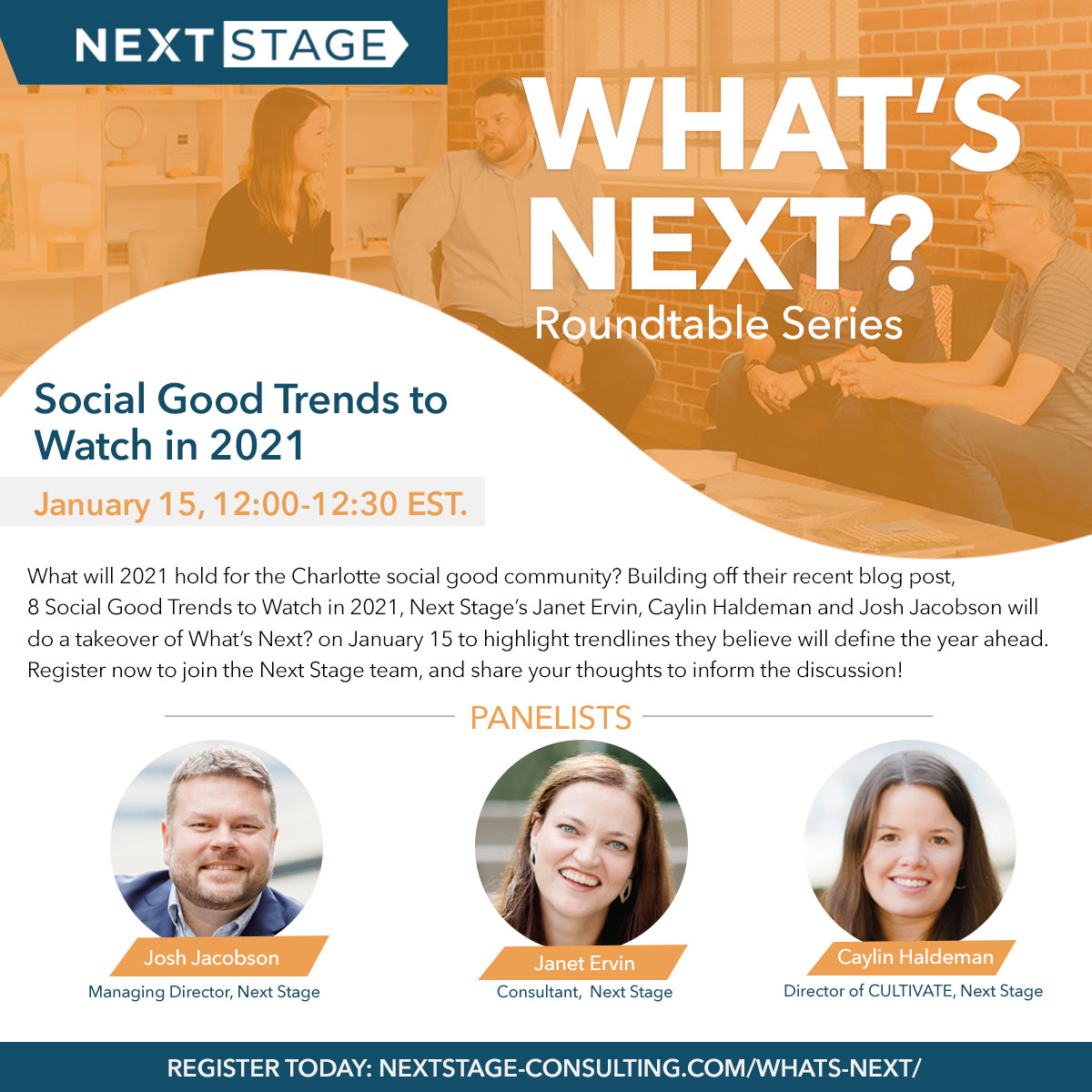by Josh Jacobson, Caylin Haldeman & Janet Ervin
We have arrived at the end of 2020 – congratulations! If you’re anything like us, you are glad to close the books on the most disruptive year in our lifetimes. As we look to the 12 months ahead, a number of themes are rising to the surface for the Next Stage team. Here are some of the trends we think will be top of mind in 2021 for Charlotte’s social good community:
Charlotte Will Continue Its Unprecedented Growth – As reported in the Charlotte Ledger, the Queen City was “one of the top cities in the country for attracting new residents since the start of the pandemic in March,” ranking in the top-10 of multiple metropolitan growth indexes. Not even a global pandemic could stop Charlotte’s continued emergence as a relocation destination.
And what’s not to love? People come to our area for an abundance of opportunities, high quality of life and low cost of living. For nonprofits, new residents are potential stakeholders in their missions and new companies are potential partners to advance their causes. But all of that growth comes with a cost. Continued gentrification, stress on the city’s infrastructure and widening of income disparities must be kept front of mind. Thankfully, our corporate leaders agree.
Social Good Will Solve Business Problems – In 2020, Next Stage launched a new study, examining the intersectionality of the nonprofit and private sector business models. We believe that 2021 is the year social responsibility shifts from a ‘nice to have’ for many businesses, to an absolute ‘need to have.’
Businesses are facing challenges such as an all-virtual workforce, employee turnover, a tight talent market and the rapidly-changing expectations of Millennial and Gen Z workers. We believe that the corporate sector may find that social good has many of the answers that will radically transform both their business and the Queen City in very positive ways. Look out for our report in April 2021.
Grassroots Organizations Will Lead the Way – The pandemic exposed cracks in the most vulnerable parts of our community that will linger long after life goes back to normal. Long-lasting impacts from the pandemic and the ongoing fight for racial justice will significantly inform how social good efforts are carried out in 2021.
Many organizations have realized the necessity of increased community voice to define the pathway forward, with grassroots leaders sought to inform processes and connect institutions with resources to people in need. Calls for substantive systemic change grow louder with advocacy a renewed platform for social good in the Charlotte region. We anticipate a sharpened focus in the coming year on how neighborhood and grassroots voices can be centered in the conversation about social change.
Organizations Will Combine Pragmatism With Creativity – Just as COVID-19 has been a disaster for education, the same can be said for most areas of social good. Gains made pre-pandemic in the areas of housing, workforce development, access to food and domestic violence were upended. Simply making sure programming could continue was a significant challenge for most local nonprofits, much less achieving the ambitious impact goals set in the naïve days of January and February.
Recovering from COVID will require a two-pronged strategy: setting realistic impact objectives that are informed by current conditions while also launching new, innovative approaches to make up for lost time. Our institutional systems of accountability like government and foundations will need to recalibrate what success looks like, and our nonprofits (informed by community voice) must have a seat at that table. Those same structures will also need to embrace new ways of doing things, investing in strategies with promise. From a programming standpoint, we see 2021 as a year of pragmatism mixed with creativity.
Partnerships Will Evolve – If nothing else, 2021 proved how interconnected everything is. Never before have we been this aware of how the wellbeing of a neighbor impacts us all. In the recent past, collective impact models and a focus on the social determinants of health got our community’s leaders thinking differently about how to solve our most pressing social issues. Those concepts came into sharp focus with COVID – a public health crisis that has had a domino effect on our most vulnerable populations.
The knock on nonprofits is how siloed they are from one another. That will need to change substantially if we are to strengthen the safety net and get back to improving economic mobility. A reluctance to partner – and we mean truly partner in deeply reliant ways – is a blind spot that nonprofits and agencies need to overcome. We think the next year will prove crucial in redesigning how we work together, and it needs the resolve of board members of local organizations to make it happen.
Digital Is Here to Stay – Digital communication has been a big part of 2020 for us – we bet it was for you as well. Along the way many of us learned that we can indeed operate remotely, that Zoom can serve as a surrogate for in-person engagement, and that online project management tools like Asana and Trello improve our operations. These platforms saved our organizations and businesses over the last year.
So what does it mean to “get back to normal,” anyway? Can you imagine doing things exactly the way you did them before the pandemic? We struggle to imagine it, and predict that these new platforms and ways of working will stick around when some semblance of normal returns, with a new hybrid workplace model emerging to prominence.
Sustainability Will Be Top of Mind – While the business models of some nonprofits were significantly waylaid by the pandemic, particularly those that heavily depended on earned revenue, many more are reaching the end of the year largely intact. Crisis funding from the COVID Response Fund and the CARES Act helped to buoy many organizations while charitable giving largely remained strong. We have heard cautious optimism from a number of our friends in the industry.
Looking ahead to 2021, there will continue to be challenges to overcome. The Brookings Institute predicts a ~5% decline in tax revenue for state and local governments over the next three years, which will likely have negative impacts on the health and human services sector that is highly subsidized by government sources. The spring fundraising event season appears unlikely to happen for another year as the top infectious disease doctor predicts herd immunity will not be achieved until fall 2021. On the plus side, foundations should have increased funding to give away following a year that saw 20%+ market returns. The health of the stock market in general will be key to continued charitable giving from individuals. A second round of PPP funding should help the organizations most devastated by the interruption to operations.
Planning Will Make a Comeback – In mid-2020, Next Stage relaunched our Friday afternoon webinar series, retitling it “What’s Next?” The question mark is intentional – what will be next for our community as the pandemic eventually gets put in the rearview mirror? The Charlotte region was going gangbusters before COVID came along. Can we get back to that feeling of self-assured confidence that fuels the most ambitious of dreaming and visioning?
We think so. Our region has all the ingredients to move forward from the year that was, getting back to the narratives that were set aside last March. But we do so wiser and better informed by this recent journey. We are already seeing nonprofit organizations, social entrepreneurs and cause-minded companies turn that corner, and we are excited to see where we go as community in 2021.
What do you predict for 2021? Let us know and be sure to tune in for What’s Next? on January 15 when our team will break down some of these headlines into practical next steps. Happy New Year!

